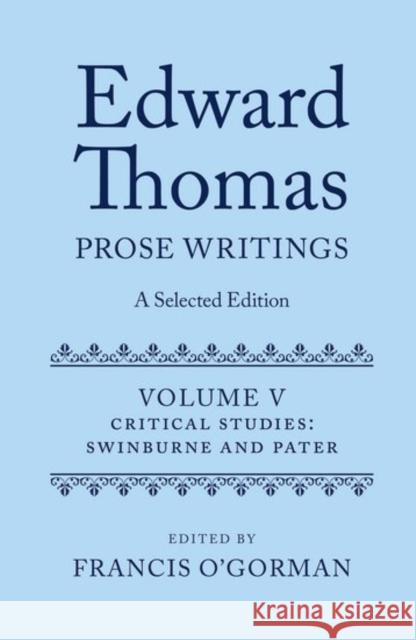Edward Thomas: Prose Writings: A Selected Edition: Volume V: Critical Studies: Swinburne and Pater » książka
Edward Thomas: Prose Writings: A Selected Edition: Volume V: Critical Studies: Swinburne and Pater
ISBN-13: 9780198738633 / Angielski / Twarda / 2017 / 500 str.
Edward Thomas is a key figure in the English literary canon. A major twentieth-century poet, he was also one of England's most experienced and respected Edwardian and Georgian critics, and an observer of the countryside second to none. Although he died at the age of only 39, his prose output was massive and encompassed a range of genres: biography, autobiography, essays, reviews, fiction, nature books, travel writings, and anthologies. While Thomas's stature as a poet is widely appreciated, his prose works have yet to be given their critical due--in large part because scholarly editions have hitherto been lacking. Edward Thomas: Prose Writings: A Selected Edition shows that Thomas's prose deserves to be much better known, by literary scholars but also the general reading public. This six-volume edition establishes him as one of the most important prose writers in English, who contributed remarkable ideas and representations of the self and community, the landscape and ecology, literature and history, the spiritual and artistic life. It is the definitive edition of Thomas's prose and a significant scholarly resource for the twenty-first century.
Volume V is dedicated to Edward Thomas's work in literary criticism. Known as a diverse and prolific reviewer of literature, including of modern poetry, Thomas also wrote a number of broadly critical studies at book length. These books helped alter his established reputation as a nature writer, and included studies of Lefcadio Hearn, Maurice Maeterlinck, and of Keats. Volume V reproduces the two most important of his work in criticism: Thomas's Algernon Charles Swinburne: A Study (1912) and Walter Pater: A Study (1913). These are crucial texts in the last few years of Thomas's career as a prose writer, in which obliquely the author assesses his own relationship with prose, analysing via two other writers what were the largest challenges for his authorship. Presented as an evaluation of two major Victorian writers, the two books are best understood as self-examination. And they are also, as the Introduction argues, telling versions of Thomas's "unlived lives" since in assessing both Swinburne and Pater, Thomas contemplates lives that he had not himself led. The books are suffused with his own dismay, self-criticism, longing, and nostalgia. They are unmissable steps on Thomas the poet's way to discovering that prose was not the best literary form for his self-expression. Fully annotated, this edition draws widely on the surviving manuscripts of these two works to present a unique insight into Thomas at work, finding the physical traces in the manuscript record of the very troubles he was claiming true of two other men. The edition includes additional material, including reviews and an early Paterian short-story by Thomas to indicate something of his debts--despite his protestations--to authors of the previous generation.










